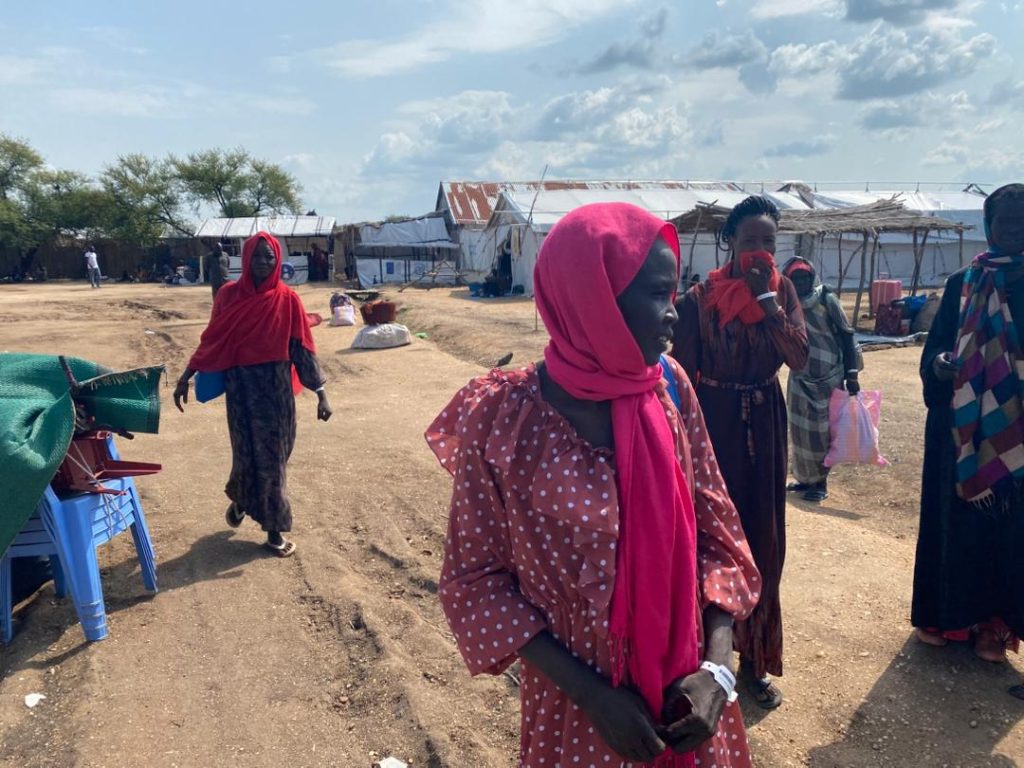Sudan Media Forum
October 18, 2025 RENK (Sudan Tribune)- Azak had lived in Sudan for forty years and worked diligently at a factory for fourteen of them. Then, one day, men arrived at her home in Khartoum and told her to accompany them to complete some “simple procedures.”
“I never expected that moment would be the beginning of a journey of torment,” Azak tells Sudan Tribune. “They took our names, noted our tribe in South Sudan, and then transported us to an unknown location.” Azak is filled with pain and regret, having been forced to leave her children behind without a chance to say goodbye.
Her story is one of many. The cries of anguish from South Sudanese citizens deported from Sudan reveal a harsh humanitarian tragedy, where people are forced from their homes and separated from their children without warning.
This report details the harrowing accounts of women forced to leave everything behind.
Tales from the heart of suffering
Mini Joseph described the cruel treatment she and her family endured when she was arrested and deported without her four children. She expressed her profound sorrow to Sudan Tribune, noting that having lived her entire life in Sudan, she had never even seen South Sudan until she was forcibly sent there.
Aluel Deng recounts being humiliated and detained with no regard for her well-being. She and her family were arrested and denied basic rights, including drinking water. “When my child got sick, I begged the soldiers for help, but they cruelly refused,” she told Sudan Tribune. “They told me, ‘Let him die.'” She described being beaten with whips, leaving them with no choice but to endure the cruelty and insults in silence.
Official and popular South Sudanese reactions
A reliable source within the Government of South Sudan stated that an estimated 111 women have been forcibly deported from Khartoum to the Renk border area and separated from their children.
The source revealed to Sudan Tribune that more than 200 children have been separated from their families, as each family has between six and nine children. “Large numbers of South Sudanese women remain in Khartoum and are expected to be forcibly deported in the coming period,” he added.
He noted that the South Sudanese public is demanding that the Juba government immediately evacuate its citizens from Sudan. They have criticized Sudan’s application of the “strange faces” law, its government’s apparent unwillingness to have South Sudanese in the country, and its accusations that they are collaborating with the Rapid Support Forces (RSF).


An urgent appeal from Sudanese civil society
The Sudanese Group for the Defence of Rights and Freedoms and the Darfur Bar Association have appealed to the National Commission for Human Rights to intervene.
Al-Sadiq Ali Hassan, a member of the Sudanese rights group, told Sudan Tribune: “The two groups launched an urgent appeal to the National Commission for Human Rights, as it is the body responsible for investigating this phenomenon and advising official bodies to stop the forced deportations.”
Ali called on international institutions to pressure the Sudanese regime to halt the deportations, adding, “but based on our follow-up, there has been no response so far.” He urged authorities to properly assess the deported women’s cases, distinguishing between asylum seekers and those wishing to reside in the country. “Asylum seekers cannot be returned under any circumstances,” he stressed. “It is also necessary to respect the cases of those who wish to stay and to treat them with dignity.”
Regarding the children moved to other locations, Hassan believes the purpose of the transfer must be investigated to determine their legal status. “But simply moving children away from their mothers without their knowledge constitutes an act of enforced disappearance,” he warned. “If this is systematic, it could amount to a crime against humanity if the legal conditions are met.”
A violation ‘alien to Sudanese ethics’
In a related development, the Civil Democratic Alliance of Revolutionary Forces “Samoud” strongly condemned the deportations. The alliance blamed the Sudanese army, its Port Sudan authority, and allied militias for the “barbaric behaviour,” describing it as alien to Sudanese ethics and a violation of international norms guaranteeing human dignity.
In a statement, the alliance expressed deep concern over the “arbitrary measures by the de facto authority,” which it said disregarded the bonds of brotherhood and shared destiny between the peoples of Sudan and South Sudan.
“This oppression is not surprising from an authority that has brought back the same grim faces overthrown by the glorious December revolution, becoming an incubator for racists, extremists, and advocates of social division,” the statement read.
“Samoud” demanded an immediate halt to the deportations, an urgent investigation, and accountability for those responsible. It also appealed to the international community for intervention to protect the victims and reunite separated families. The alliance urged South Sudan not to retaliate against Sudanese refugees in its territory, noting that they too are “victims of the tyranny of the coup plotters, war merchants, and blood generals” in Sudan.
Imposing state authority
Meanwhile, Sudan’s security authorities announced an operation to “regulate the presence of foreigners” in Khartoum. A police press release stated that foreigners living in the country illegally will be returned to their home countries, while those with invalid permits must regularize their status or leave.
The release added that refugees will be moved to designated camps and that campaigns will be launched to apprehend violators. It concluded by affirming that authorities welcome foreigners who are legally present in the country.
—-
The Sudan Media Forum and its member institutions are publishing this article, prepared by Sudan Tribune, to highlight the suffering of South Sudanese citizens forcibly deported from Sudan—especially women separated from their children and subjected to gross human rights violations. It covers official and popular reactions in South Sudan and the condemnation by Sudanese civil society of these practices, which are considered violations of law and humanitarian norms.




